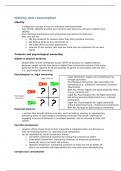Identity and consumption
Identity
- = subjective concept of how an individual view themselves
- Your identity determines what you consume and what you consume confirms your
identity
- Also individual experiences and what group one (wishes to) belong to
- Why care abt id?
o We buy products for reasons other than their practical functions
o We believe what we buy represents us
o We judge others by their possessions
o How we fit into society (and how we stand out) are important for our well-
being
Products and psychological ownership
Digital vs physical products
- people differ in their willingness to pay (WTP) for physical vs. digital products
- because: people ascribe less value to digital than to physical versions of the same
good due to the capacity for physical goods to garner an association with the self
(i.e., psychological ownership)
Psychological vs. legal ownership
- Legal Ownership: legally own something (e.g.,
through purchase)
- Psychological Ownership: feel ownership over
something (e.g., emotional connection, personal
attachment)
- Both Yes: Person legally and psychologically owns
it (e.g., personal car)
- Legal No, Psychological Yes: No legal ownership
but strong personal attachment (e.g., a shared
workspace).
- Legal Yes, Psychological No: Legal ownership
without attachment (e.g., impersonal investment)
- Both No: No legal or psychological ownership
Prosocial behavior
(e.g., random object)
- = actions that benefit others or society, such as helping, sharing, or volunteering
- Activating sense of psychological ownership increases individuals’ likelihood of
engaging in prosocial behavior in unrelated domains, due to increase in state self-
esteem
Favorite possessions
- negative effect of perceived income inequality is mitigated when one focuses on
their favorite possessions via reducing social comparison
- can be explained by social comparison theory
o we better understand ourselves by comparing ourselves to others
o Downward Comparison: Comparing ourselves to those we perceive as
worse off, which can boost self-esteem
o Upward Comparison: Comparing ourselves to those we see as better off,
which can motivate self-improvement but may also cause dissatisfaction
Conspicuous consumption
, - = Signal value of possessions & consuming to signal wealth/ high status
- Busyness
o Busyness has become status symbol of our time eg ‘ugh im so busy’
there is a conspicuous consumption of time
o Mostly performed by people who think rather highly of themselves
- Human Capital: Skills and
expertise make individuals
valuable
- In Demand and Scarce: Being
busy signals that one's time is
limited and in demand
- Status Inferences: People infer
high status from busyness, as it
suggests importance and high
human capital
- Busy vs. Leisurely Lifestyle: A
busy work life (vs leisure) is
now seen as a sign of high
(Non) conformity
- nonconformity can signal higher status and confidence
- intentional nonconformity (e.g., unique fashion choices) can lead others to
perceive individual as having higher status, competence, or autonomy
- mostly performed by people with higher need for uniqueness
meanings and associations
Understand ourselves, also in comparison to others: Use categorizations &
comparisons to make sense of others’ identities:
- social categorization
o We categorize world in relation to ourselves by finding similarities and
differences:
• person perception (i.e., perception of others) is often affected by
material possessions one has
• Object perception (i.e., classification of objects) is often affected by
marketing & advertising
o Social categorization, in turn, see individuals as representation of groups or
their possessions, beyond what individual stands for
- Self-discrepancy theory
o Three different types of schema (i.e., set of expectations and associations
about a given object)
• Actual: who you actually are—attributes & charac you currently
possess
• Ideal: what you wish to become-- attributes & charac you aspire to
have
• Ought: what/who you believe you should be-- based on social or
moral standards, eg expectations from family, society
, o Eg consumer may buy luxury product (to match their ideal self) or
sustainable product (to align with their ought self)
- Media & beauty ideals
o Images promote ideal bodycreates body image concernsmental &
psychical implications
Tedtalk: How adaptive clothing empowers people with disabilities
Introduction
Mindy Scheier (founder of Runway of Dreams Foundation) talks abt adaptive clothing
designed to meet needs of people with disabilities/elderly (eg easy fasteners/closers,
sensory-friendly fabrics, flexible designs) can empower & break down societal barriers
related to fashion. Adaptive clothing not just abt physical accessibility but also abt social
acceptance & ability to express identity through personal style, feel confident, be more
indep & she emphasizes why this shift in clothing design matters for disabled (inclusivity
and representation)also wanted to educated fashion indus & she collaborated with
them
Key Points
- Power of Clothing: plays significant role in shaping identity and self-expression, for
disabled it can help restore dignity, independence, personal choice
o proven by scientist
o Enclothes cognition: co-occurrence of 2 factors: symbolic meaning of clothing
and physical experience of wearing clothing, both have correlation to how you
feel abt yourself
- Challenges Faced by People with Disabilities: struggle to find fashionable clothing that
fits their needs (often lacks style, functionality, mainstream brands do not offer
inclusive options)
- Need for Inclusivity in Fashion: advocates for an inclusive fashion industry that
recognizes diverse needs clothing should be accessible and adaptable to all, not just
‘able-bodied’
- Innovation in Adaptive Fashion: She highlights brands and designers who are creating
fashionable & functional adaptive clothing
Evidence/Examples
- Real-Life Impact: Scheier shares story of her son, who has muscular dystrophy, and
how he struggled with clothing that did not meet his needsinspired her to start RDF
and collaborate with brands to create adaptive clothing lines
- Brand Partnerships: Scheier discusses partnerships with major brands like Tommy
Hilfiger, has led to creation of adaptive clothing lines, showing that mainstream
companies can be part of solution
Decision biases
Conventional eco
o Only focused on numbers/stats
o Consumers are rational and are utility-maximizing in decision-making, and
have consistent and stable preferences
Behavioral eco
o Takes psycho into account
o Assumes that people are irrational/inconsistent




